Neon Hearts City review
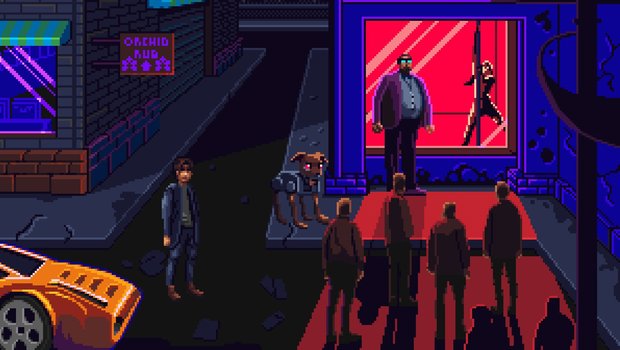
- 1 Comment
It shorts out sooner than you’d like, but all the signs of a quality Cosmic Void adventure are on display in this stylish neo-noir mystery
Indie developer Cosmic Void is gradually moving up in the world of adventure game production. After having already self-published an impressive catalogue of both text parser and point-and-click games, the studio’s latest title, Neon Hearts City, is published by Dionous Games. And it could have been a match made in neon heaven, if only the game had a little more juicy meat on its bones. The game combines the art style and atmosphere of Devil’s Hideout with the third-person interface of Twilight Oracle to give us a dystopian science fiction story about a private investigator’s search for a missing young woman. All the ingredients are here for a compelling mystery, but at just a little over two hours long, it's only a short story instead of a full adventure game novel. Thankfully, it demonstrates some wonderful pixel art wizardry and fine storytelling while it lasts, with some solid writing about what it means to be human, and how our memories make us who we are.
Elijah Crow is a P.I. specializing in missing persons cases. One night when he just wants to get a bowl of ramen at his favorite take-out place while monologuing about his weary life in this city – as noir detective protagonists are wont to do – a woman named Scarlett approaches him. She tells him her teenage daughter Audrey has been gone for three weeks, and the cops don’t seem to care all that much. Taking pity on Scarlett, Elijah accepts the job. This sets you off on a rather linear search through the city, talking to other characters, moving from clue to clue while completing inventory puzzles, fetch quests, and a couple of logic brainteasers.
Neon Hearts City is set in a futuristic cyberpunk world. High above the city floats the airborne Roarke prison, its mere sight terrorizing the people below. Managed by the “thought police,” not only does it lock up people who have had “unsuitable” opinions about their lives and society as a whole, it also picks up random and often innocent people just to reach their daily quota of keeping the population under strict rule. Whether innocent or “guilty,” the Roarke tyranny then proceeds to wipe people’s memories, so they have no recollection of their bad thoughts or the things that might have instigated them. The people are reset, if you will, and then reintegrated into society, once more as docile lambs. It all felt to me like a combination of Sin City and Blade Runner; there’s even a reference to dreaming of electric sheep.
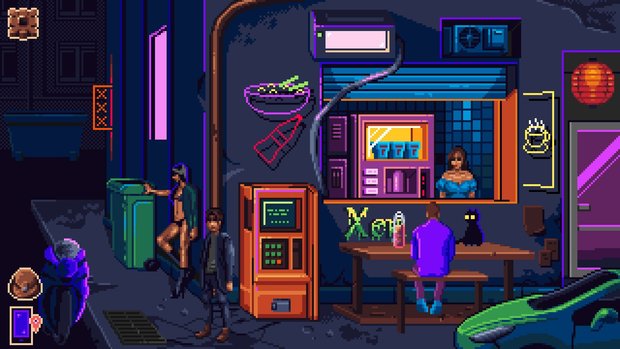
Everywhere you go, the city is rife with robots and androids. You will meet some very apparent bots, like a mechanical dog and a huge metallic specimen straight out of a sci-fi movie who is looking for its lost parrot, but also some clearly humanoid ones. The ones that call themselves Ravens are trying to become more and more human in character. I’m not exactly sure how that works, except for a mention of cybernetic upgrades and watching the dreams of humans that have been put on computer chips and inserted in VR helmets. Conversely, humans can get technological implants that make them more robotic, like a zoom lens for their eyes and a telepathic chip so they can communicate without actually talking.
There’s lots going on in this world involving Roarke and the androids, and of course Elijah will soon discover there’s much more to the disappearance of young Audrey as well, so all of the lore you learn along the way isn’t just filler. It’s a bit of a shame, then, that with so much detail put into building this world, the story takes only a couple of hours to get through, and the end credits roll just when things are starting to get REALLY interesting. There’s talk of revolution, but unless there’s a sequel that someday returns us to this place, I guess we will have to imagine things finally picking up again for the city's inhabitants ourselves.
Your investigation takes place at night, with beautifully drawn pixel art featuring lots of dark blue and brown tones, with brighter yellow, red and pink neon lights and signs. Clicking on a cellphone icon in the lower left corner of the screen opens up the city map, a black street grid lined with dark blue-purplish buildings. Places you can actually visit light up a brighter blue. As you progress, you will unlock several different locations. The game starts at the outdoor ramen place but you’ll soon visit a basketball field, a laundromat, a pizzeria, a comic book store, a couple of rooftops, a cybernetics lab, an android scrapyard, and the beach.
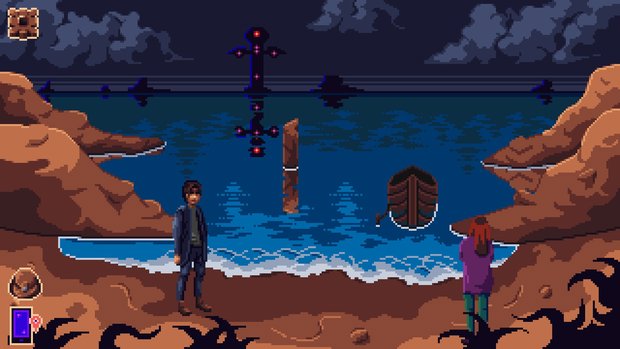
Most locations consist only of one screen large each, though there are some exceptions as you find more clues and the need arises to dig deeper into the heart of the city through its back alleys. At first the game’s linearity seems so strict that you will only ever visit each place once, so I was happy when I sometimes ended up having to return to a particular location in order to solve a new puzzle.
I did lose some time looking for on-screen exits, being so used to easily finding them in other adventure games. One time I found myself on a rooftop with a very obvious door back into the building. Thinking I had to leave that way, I tried several times to open the door. But since it didn’t become an active hotspot, eventually I assumed it had to be a bug and that I was stuck. Only then did I realize I had to manually open the map on Elijah’s phone instead. There are several other places where I expected an on-screen exit as well.
While I definitely enjoy the pixel art style that Cosmic Void has developed, it’s nothing compared to the audio. Neon Hearts City features a great soundtrack, with 80s-sounding synthesizer, piano, and plenty of other instruments really setting the mood for a futuristic neo-noir mystery. Not only that, but the characters are voiced with generally good performances, their actors bringing a decent amount of emotion to their roles. The only exceptions are a very few minor caricatures, like an annoying, gruff-sounding, heavyset bouncer, though of course that’s the way he was written. Everyone else sounds very natural, portraying modest, authentic human beings living their own lives and hoping to someday achieve their own dreams. The city is full of non-playable characters like a basketball player, the owner of a pizzeria, a fish vendor, a lab technician, and an exotic dancer, each of them with a distinctive visual design as well. Best of the bunch is our main investigator Elijah, voiced by Rowdy York, who plays the role of life-weary private dick to the letter.
Gameplay uses a simple one-click interface. The arrow cursor has a small blue dot that turns red whenever you hover over a hotspot. Click and Elijah will comment on the object in question and even pick it up if he can. You’ll collect loads of inventory items which you can access through a bag icon in the lower left corner of the screen. It’s an unfortunate placement, as I would often click the wrong icon when I wanted to open the inventory and wind up on the map screen instead since they are so close together, and with no back button I had to enter the current location anew. You can combine inventory items or use them directly on hotpots in the environment. Usually you will only have to use them once, after which they either break or Elijah automatically discards them for another reason.
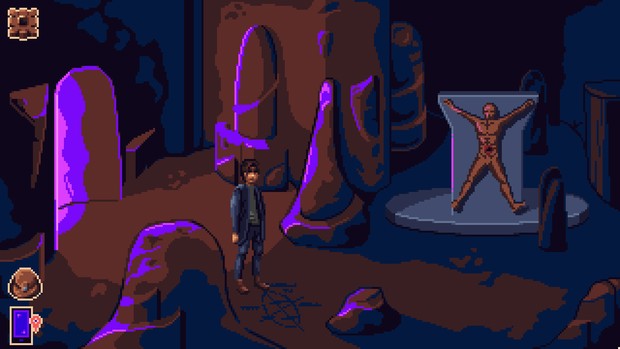
Most puzzles are of the inventory and fetch quest variety. For instance, the basketball player who knew Audrey will only talk if you get him a beer, but the store sold the last beer to another customer, so you need to find a way to take it off his hands. Later on you need to camouflage a boat, but even though the giant robot Amadeus has something that can help you, he will only part with it if you help him get his lost bird back.
Besides the inventory puzzles, there are a couple of signature Cosmic Void logic puzzles that I quite enjoyed. There’s a cryptic message to decipher to find the right comic book in the store; some slider puzzles to activate technological gadgets or disable security systems (the latter you can skip if it’s taking you too long); a secret message left by Audrey in a console, for which you need to work out the password; and a box with images you have to put into the correct order.
The last one tripped me up a bit. Once I found the box, the symbols themselves seemed to hide a kind of logic, an order I needed to figure out on my own. Thinking of a similar puzzle in Devil’s Hideout, I tried to open the box but nothing I did worked. Since I still had other leads to follow up, I left it for later. Eventually I reached a new location where someone gave me cryptic descriptions of the right symbols for solving the puzzle, which turned out to be a very random order with no logic behind it. And as it turned out, I was even more fooled since the object wasn't a box at all, but a sort of remote control I could only use in that new location anyway, meaning I needn’t have wasted all that time trying to solve it earlier.
It also made me wonder how such a key item could be found where it was, which seemingly had nothing to do with the overall story. I couldn’t really figure it out, making it seem rather arbitrary and just a tad too convenient, as if it simply existed for the ensuing puzzle. There are multiple instances where I found clues in inexplicable places that created more questions than answers, like why you would display a secret phone number somewhere that's blatantly visible for all to see.
Final Verdict
While I wish Cosmic Void would start to make longer, deeper games, because I really think the studio's solo developer has the right stuff, there’s surely an audience for short games like this. Even I often enjoy playing through a quick game between larger behemoths, just to relax the mind a bit while still enjoying a cool story and some fun puzzles without demanding any major commitment. In this case, however, I thought the ending came even more abruptly than in Devil’s Hideout, leaving me wanting more. At least the story makes you think about life, its most important question being who you would choose to be if you couldn’t remember anything and had a chance to start over. But when it comes to sci-fi tales of androids and lost memories, I fear this one might wind up as just one more among many, even with stylish pixel art, music and voice-overs combining to bring it very much to life. Which would be a shame, because if Philip K. Dick were alive today and fancied a career in adventure games, his work might bear some similarities to Neon Hearts City.
Hot take
Its short length prevents Neon Hearts City from shining as brightly as it could, but slick production values, solid writing and simple but entertaining gameplay make for an intriguing enough tour while it lasts.
Pros
- Well-written short story-length sci-fi mystery tale
- Integrated brainteasers introduce some gameplay variety
- Detailed character designs brought to life by a natural-sounding voice cast
- Stylish pixel art backgrounds in the now-familiar Cosmic Void style
Cons
- Location of certain key items seems random
- Inventory and map icons too close together
- Short length and low challenge won’t appeal to those looking for a deeper experience
- Lacks a grand finale, resulting in a sudden conclusion
Johnny played Neon Hearts City on PC using a review code provided by the game's publisher.


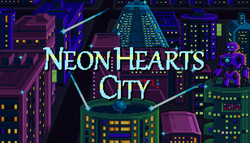
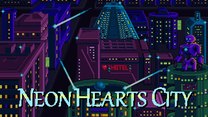
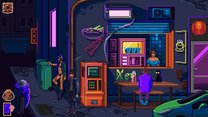
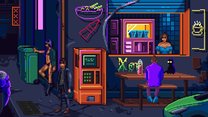


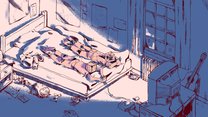
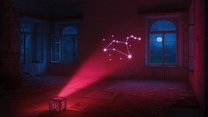
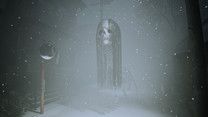
1 Comment
Want to join the discussion? Leave a comment as guest, sign in or register in our forums.
The game had an abrubt ending I would like to have played longer, really enjoyed it, the graphics, voice acting and the story line were great and I would love to play a part 2 or series even.
Reply
Leave a comment